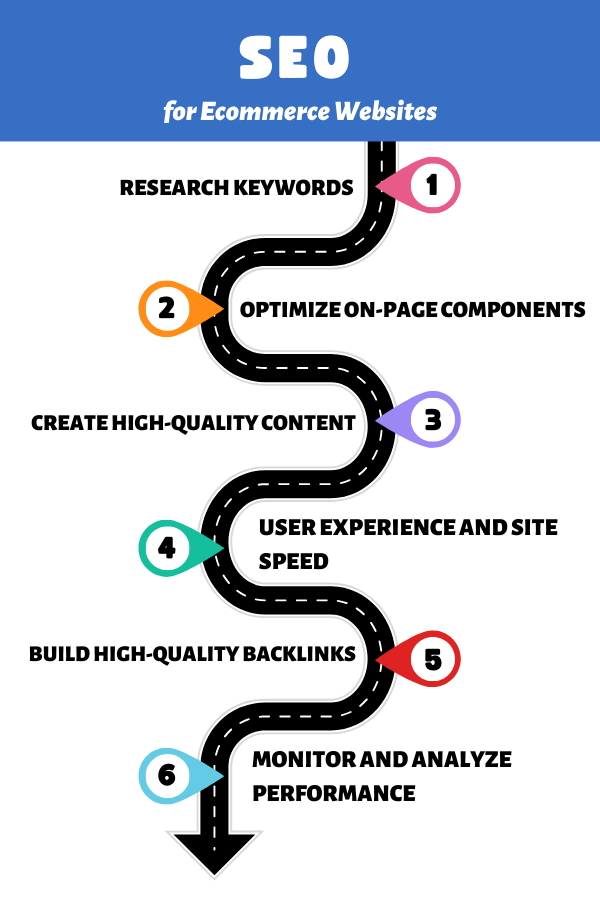A strong web presence is essential for any ecommerce business to succeed in the modern digital era. Search engine optimization is one of the best techniques to improve your internet visibility and attract more natural traffic to your website (SEO). You may raise your website’s position on search engine results pages (SERPs), draw in more visitors, and eventually boost revenue by putting SEO best practices into effect. We’ll look at a systematic approach to SEO optimization for your e-commerce website in this article. Here’s an SEO strategy for an e-commerce website.
Website Structure SEO for E-Commerce

Research Keywords
The foundation of a prosperous SEO strategy is a comprehensive keyword research strategy, especially when optimizing for specific niches like SEO for commerce websites. To commence, ascertain pertinent terms and expressions that prospective clients are probably going to employ while looking for goods or services comparable to yours in the ecommerce realm. To find high-volume keywords with reasonable competition, use keyword research tools like Ahrefs, SEMrush, or Google Keyword Planner, ensuring SEO for e-commerce websites among the targeted keywords. Targeting a combination of long-tail and short-tail keywords can help you reach more people and fulfill more search intent effectively, thus enhancing your website’s visibility and attracting potential customers within the ecommerce space.
Optimize On-Page Components
In order to increase the exposure of your online store, you must optimize the on-page components once you’ve identified your target keywords, such as SEO for ecommerce websites. This involves strategically incorporating relevant keywords into various elements of your web pages, including picture alt attributes, heading tags (H1, H2, and H3), meta descriptions, and title tags. By integrating these keywords thoughtfully, you can inform search engines of your content’s relevance to users’ searches.
Create High-Quality Content
In addition to increasing engagement and attracting inbound links, high-quality content is essential for SEO and may position your e-commerce website as an authority in its field. Think about producing educational blog articles, product manuals, tutorials, and other pertinent content that speaks to the specifications and inclinations of your target market. Naturally, include targeted keywords in your writing while preserving readability and relevancy.
User Experience and Site Speed
Two important ranking variables that can have a big impact on your website’s SEO performance are site speed and user experience. Make sure your e-commerce website loads quickly by using browser caching, optimizing pictures, and minifying CSS and JavaScript files for all devices and browsers. To improve the user experience and entice visitors to explore your website further, incorporate intuitive design elements, calls-to-action that are explicit, and a user-friendly navigation structure.
Build High-Quality Backlinks
Another crucial component of SEO for ecommerce websites is constructing high-quality backlinks from reliable websites. Prioritize obtaining backlinks from reputable and pertinent sites in your sector by using techniques like influencer collaborations, content syndication, and guest blogging. Publish informative, readable material that will automatically draw links from other websites, enhancing the authority and trustworthiness of your website in search engine results.
Monitor and Analyze Performance
Utilize resources like Google Analytics and Google Search Console on a regular basis to track and evaluate the SEO success of your e-commerce website. Keep an eye on important indicators such as organic traffic, keyword ranks, conversion rates, and bounce rates to spot areas that need work and adjust your SEO plan appropriately. Stay up to date with changes in the industry and algorithmic changes to ensure that your e-commerce website remains competitive in the always-shifting SEO scene.
Conclusion
Finally, in order to completely actualize the potential of your e-commerce website, you must put the ideas described in this article into practice. By making SEO optimization your priority, you’re not only making yourself more visible to prospective clients but also building the foundation for sustained success in the online market. Keep in mind that SEO is about building relationships with your target audience, offering value, and building trust—it’s not simply about getting you to rank higher on search engine results pages. Remain dedicated to honing your strategy, keeping up with market developments, and making adjustments when necessary. You’ll be in a strong position to prosper in the quickly evolving e-commerce market.
FAQs for SEO for ecommerce websites :
How can I raise the search engine rating of my e-commerce website?
Improve your website’s speed and mobile friendliness, build high-quality backlinks, update material often, and optimize product pages with relevant keywords to raise your site’s search engine ranking.
Which SEO-friendly tactics work best for product page optimization?
Enhance product pages by utilizing catchy titles and meta descriptions, superior photos, original product descriptions with focused keywords, and making sure the navigation is easy to use.
How can I pick the ideal keywords for my online store?
Employing resources such as Google Keyword Planner, SEMrush, or Ahrefs, conduct keyword research to find relevant keywords with moderate competition and high search traffic. Make use of a combination of long and short-tail keywords associated with your business and line of goods.
In what way does content marketing improve SEO for E-commerce Websites?
Because it raises search engine rankings, establishes authority, and draws in organic visitors, content marketing is crucial to SEO for e-commerce businesses. Write educational tutorials, product guides, and blog entries that naturally include targeted keywords while addressing client demands.
Should I concentrate on any particular technical SEO components for my e-commerce website?
Yes, pay attention to technical details like making sure your site loads quickly, enhancing its crawlability and indexability, incorporating structured data markup (like schema.org) for product details, and making sure your design is mobile-friendly. For improved SEO performance, also take care of problems with URL structure, duplicate content, and broken links.

